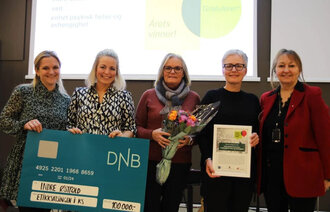What can promote ethical decision-making skills in newly qualified nurses? A discussion article on the conditions for good ethical reflection in clinical practice
Cite the article
Lockertsen V, Mo A. What can promote ethical decision-making skills in newly qualified nurses? A discussion article on the conditions for good ethical reflection in clinical practice. Sykepleien Forskning. 2024; 19(95849):e-95849. DOI: 10.4220/Sykepleienf.2024.95849en
The nursing profession is built on fundamental principles of respect for the individual’s dignity and integrity. Educational institutions have incorporated ethics into their curricula and facilitated clinical placements that stimulate reflection and critical thinking.
However, newly qualified nurses routinely face a higher demand for ethical literacy than they are prepared for. This can be viewed as a systemic failure.
Nevertheless, nurses’ ethical decision-making skills are often treated as something individual and private – both by managers and nurses. Newly qualified nurses can find this burdensome. These challenging decision-making processes can lead to early burnout in newly qualified nurses and an unnecessarily high staff turnover.
How are newly qualified nurses supposed to navigate ethical principles in a health service characterised by nurse shortages, complex care pathways and an increasingly tighter financial framework?
Newly qualified nurses are poorly equipped for ethical reflection
Nursing entails a holistic and ethical approach. Nurses are morally obliged to respect and maintain the dignity and integrity of individuals. Various factors are challenging these values, such as the increased use of technology, the medical complexity of treatment and the focus on healthcare costs. Such developments have a major impact on the work of newly qualified nurses (1).
The ethical decision-making skills of a nurse entail an ability to interpret situations, judge which actions are right and wrong, prioritise competing moral values and have the courage to stand by their own clinical reasoning in interactions with colleagues. Together, these characteristics will constitute newly qualified nurses’ action competence (2).
In the study by Heggestad et al. (3), third-year nursing students found it challenging to manage their emotions while also having to provide professional care and show moral courage when confronted with poor patient care.
Students do not receive adequate supervision during clinical placements
Educational institutions facilitate the learning of ethical decision-making skills by incorporating ethics into the curriculum and ensuring that 50% of the study programme is made up of clinical placements. However, approximately half of all nursing students feel ill-prepared for what awaits them after qualifying as a nurse (4, 5).
This suggests too wide a gap between how educational institutions address ethics and the reality of ethical choices in practice. The disconnect between theory and practice can make it challenging for students to identify ethical issues in their daily work and discuss them with their supervisor. A further barrier may be the lack of role models who can teach nursing students how to discuss ethical issues in practice (3, 6).
This can partly be explained by the wide variation in the quality of clinical placements and the lack of quality assurance regarding the competence of supervisors at these placements. In a survey of over 22 000 members of the Norwegian Nurses Organisation, newly qualified nurses, supervisors and teachers reported that students often do not receive adequate supervision during clinical placement (7).
Ethical reflection is rarely discussed during clinical placements. This could be seen as indicative of how healthcare personnel’s value conflicts and clinical reasoning are not openly discussed, and are instead treated as individual rather than collective concerns (6). Other research shows that nurses tend to perceive value conflicts as something personal, and therefore base their ethical decision-making on their own emotions and thoughts (8, 9).
We believe that educational institutions have an additional responsibility to actively develop students’ ability to communicate their own values and ethical considerations. This will require study programmes to engage more dynamically with students’ decision-making skills than in the current rigid educational framework. In doing so, the education will be adapted to the student’s level of reflection and ethical decision-making skills.
Developing a common language for ethical reflection is crucial
At the start of nurses’ careers, there is a mismatch between external expectations and their own abilities. Consequently, newly qualified nurses often experience high stress levels related to ethical decision-making processes. At this point in their career, they have not yet developed skills in clear communication, critical thinking and stress management (10).
Developing ethical decision-making skills can take time, making it challenging for individuals to have the courage to deal with the perceived moral pressure (9). Stressed nurses tend to become less attentive and neglect their own well-being, which prevents them from performing at their best in interpersonal interactions (11).
We found that in many departments there is little difference in the distribution of responsibilities between newly qualified nurses and experienced nurses. Newly qualified nurses are soon faced with a high demand for independence and professional confidence in a complex clinical environment (10). This results in a major gap between their ability for theoretical reflection and the demands of clinical practice, which in turn challenges their ability to articulate their ethical reasoning (6, 12, 13).
Through systematic leadership, a common language is created for the ethical challenges that arise in direct clinical work. Managers must facilitate a shared understanding between experienced and inexperienced nurses. We therefore believe that various levels should be involved in the systemic effort to develop all nurses’ ethical decision-making skills. It is important to incorporate reflection into the clinical work and through meta-reflection.
Managers can apply nurses’ code of ethics
Relatively little is known about how the nursing code of ethics is applied in clinical practice nationally, but Blackwood and Chiarella conducted a literature review on how the ICN (International Council of Nurses) Code of Ethics for Nurses was used by nurses globally (8).
They asked why, despite recognising the potential value of the Code of Ethics, nurses often fail to implement them in clinical practice. An important factor was how nurses tend to rely on their own personal values instead of the code. This finding suggests that the code is not perceived as relevant in clinical work and is difficult to apply directly in the context of ethical reasoning in clinical practice.
Alternatively, reflection can be structured according to the four principles of medical ethics: beneficence (doing good), non-maleficence (to do no harm), autonomy (for the patient) and justice (ensuring fairness). Using such a structure can help newly qualified nurses articulate the ethical challenges in a situation.
In addition to supporting decision-making processes, this approach can help distance the nurse from their own emotions and values. This allows newly qualified nurses and their colleagues to gain better insight into both the universal and the individual elements of the situation.
Clinical supervision for managers as well as nurses
Managers frequently feel uncertain about how to support new nurses’ ethical decisions (6, 14, 15), and newly qualified nurses often lack the prerequisites for making such decisions. We therefore call for both parties to regularly take part in a forum that enables them to gain better insight into and reflect on the challenges they face. Key organisations such as the Norwegian Association of Local and Regional Authorities (KS) and the Centre for Medical Ethics (SME) implemented long-term initiatives aimed at improving the conditions for ethical reflection forums in clinical practice (16).
This is evident through clinical ethics committees, as well as the introduction of ethics reflection groups primarily aimed at strengthening the employees’ ethical literacy (17). Holding regular meetings of ethics reflection groups has positive effects for the participants, such as improved cooperation between colleagues, patients and families (18). Not only does communication improve, but many also experience a more open and tolerant working environment.
Another possible structured approach to meta-reflection is clinical supervision groups. Clinical supervision is defined as a formal, relational and educational empowering process aimed at strengthening a person’s proficiency through dialogue based on knowledge and humanistic values (19).
Clinical supervision enables ethical care values to be articulated and clarified in practice, and has a normative function in the same way as ethics reflection groups. It also places an emphasis on the formative aspect by enhancing competence and expanding the individual scope for action. Furthermore, supervision can have a restorative function through reinforcement, confirmation and acknowledgement. It can thus help to reduce the moral stress that many nurses experience (20).
Unfortunately, we found that the scope for meta-reflection is under pressure. Many find it difficult to prioritise participation in such groups due to consideration for patients and colleagues. The key to effective factors in supervision lies in regular participation and a manager who facilitates this.
Can we create a culture for joint ethical reflection?
Newly qualified staff often turn to their experienced managers and older colleagues for guidance on work practices and ethical issues. Managers and colleagues thus play a crucial role in developing ethical decision-making skills in newly qualified nurses (6, 21). Scope for reflection is created in the working environment. It is crucial for new nurses’ managers and colleagues to be supportive and open to them having the courage to share their reflections (21).
The ethical climate and hierarchical structure in a department thus impact on the newly qualified nurse’s moral courage and how they communicate their own thoughts (9). Negative social dynamics add to stress and uncertainty when discussing ethical issues and dilemmas (1, 8). The consequence is a lack of openness, which affects not only the new employee, but also patient care and the collective achievement of goals among colleagues.
Experience shows that nurse managers are often clinical experts with extensive professional competence that enables them to understand the nurses’ value conflicts. However, these conflicts must be balanced against a tight financial framework, high output demands and a variety of administrative tasks. The consequence can be a leadership style that is more focused on maintenance and operations than on guiding and supporting ethical decision-making processes (14, 15). In light of newly qualified nurses’ often limited organisational understanding, it can be difficult for them to interpret the various motives behind their manager’s reasoning (10).
The cross-pressure between the moral and ethical values of individual nurses, colleagues and the health institution can inhibit the new nurse’s capacity for ethical reflection, exacerbate feelings of inadequacy and create unnecessary stress (22). As a result, newly qualified nurses end up adopting the visibly demonstrable values and priorities, even if they conflict with their own beliefs.
A nurse who lacks clinical experience may not yet have developed the ability to clearly communicate their own values (10). Constantly feeling like they are going against their own values or not getting support for what they consider ethically right in a situation can feel like a threat to the new nurse’s professional identity.
Managers regard value conflicts as personal
In our experience, if managers are open about their attitudes and priorities, this will have a significant impact on how newly qualified nurses think about and manage ethical issues. However, evidence shows that when managers focus on ethical decision-making skills, the emphasis is often on clinical ethics committees or guidelines and procedures (23).
While we believe this may have positive synergies for ethical decision-making at an organisational level, it does not necessarily improve the ethical decision-making skills of newly qualified nurses. When nurses are guided by guidelines and procedures, this does not fill the gap between their ability for theoretical reflection and practical ethical reasoning.
We believe that nurses’ tendency to view value conflicts as something personal is related to managers’ inclination to perceive nurses’ value conflicts as a personal concern. When managers treat ethical decisions as something private and intimate, the ethical responsibility is placed on the individual nurse, with arbitrary outcomes (24, 25).
This not only has ramifications for patient care but also feels like a personal burden for the newly qualified nurse. In our experience, managers are essential for promoting ethical discussions to ensure that ethical decision-making becomes a joint process.
This would expedite newly qualified nurses’ development of a language for the dilemmas they face and prevent the working environment from symbolically imposing more individual responsibility on them. Through robust leadership, managers can influence their employees, ensuring that they have the same understanding of what is right and wrong, important and unimportant, effective and ineffective (26). This obviously requires the managers themselves to have the time, courage and initiative to actively participate in value discussions with their employees, and dare to share their ethical considerations.
Conclusion
We believe that nurses’ tendency to view value conflicts as a personal matter creates unnecessary stress and burnout in new nurses. We would therefore like them to have a working environment in which experiences and ethical reflections are systematically shared. In our experience, this gives nurses a greater sense of security and belonging.
The quality of reflection can be improved by actively applying the principles of medical ethics, having open discussions and providing regular guidance. This will transform ethical reflection into a shared responsibility rather than an individual concern. By developing a common language, conflicts can be recognised and shared, thus easing the heavy burden that many new nurses struggle with.
Through systematic guidance and support from experienced colleagues, newly qualified nurses will have the opportunity to learn from the past experiences and perspectives of others. Competence in ethical reflection thus becomes a collective responsibility.
The authors declare no conflicts of interest.
Open access CC BY 4.0





Comments